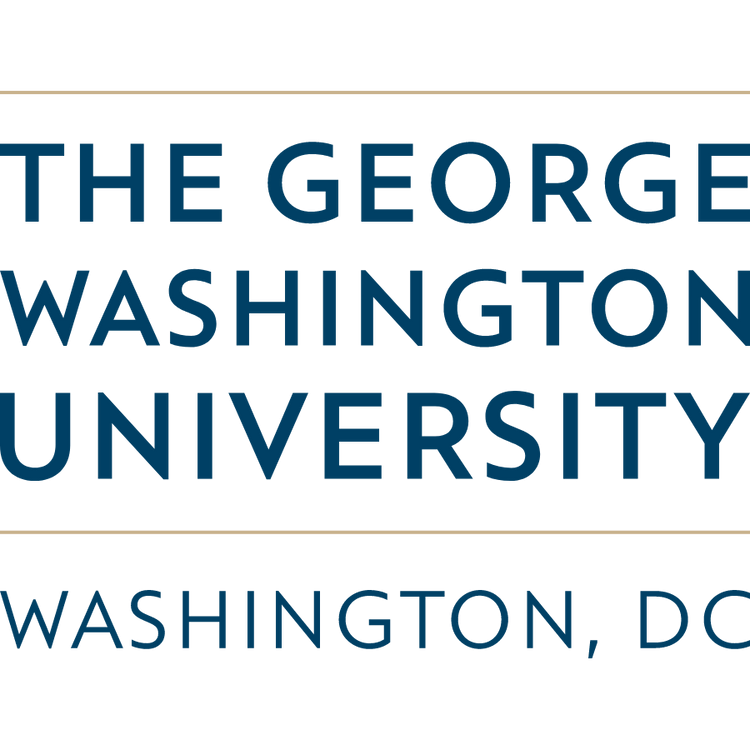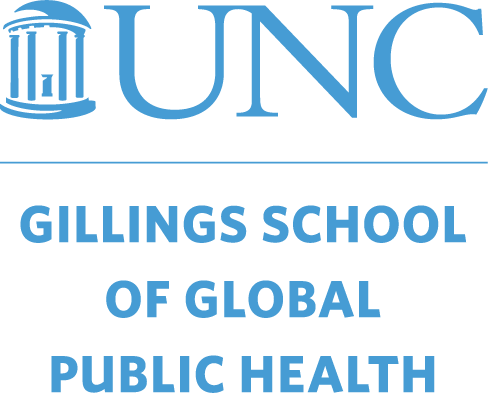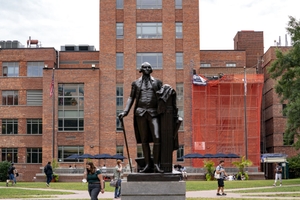MPH@GW: An Online MPH With Connections in Washington, D.C.


Public health professionals are in high demand and enrollment in online master’s degree programs is growing—that’s why Fortune wants to help prospective students navigate this burgeoning field. For the second year, Fortune is releasing its ranking of the best online master’s of public health (MPH) programs. In total, we ranked 14 online MPH programs. This ranking was last updated May 2023.
A master’s of public health, or MPH, is an interdisciplinary graduate-level degree that’s designed to educate students about a range of public health issues, including: epidemiology, biostatistics, environmental health, health policy, and community health. Students in MPH programs will learn how to improve a community’s health and prevent disease and illness. Master’s degree programs in public health are offered both online and on-campus, though there’s no real difference beyond the format—rather, students can expect to be offered the same classes taught by the same professors.
Because public health is such a wide-ranging topic, you can expect to take some general, foundational courses in a master’s degree program in public health—and then choose a concentration for specialization with the remainder of your time. At top-ranked George Washington University, for example, the core curriculum accounts for 29 credits of the 45-credit program. Core competencies in a program range from science-related aspects of public health and the fundamentals of health policy to those that teach students to improve their communication and leadership skills. In general, expect an MPH curriculum to cover:
In addition to completing the required curriculum, students in graduate-level public health programs will branch off into specific concentrations depending on their interest and career aspirations. The range of possible specializations and concentrations vary by program, though there are 48 separate areas of study, according to the Association of Schools and Programs of Public Health. Some popular concentrations include:
Admissions requirements for master’s degree programs in public health can vary by school, including the amount of relevant experience incoming students bring. The University of North Carolina, for example, attracts many students who don’t currently work in public health and are trying to enter the field—so it doesn’t require any specific level of undergraduate training among applicants. Meanwhile, Johns Hopkins University requires that applicants must have at least two years of post-undergrad experience working in a health-related field, as well as coursework in biology, math and a health-related science (or a second biology course).
Online MPH programs generally require the following as part of the application process:
None of the online master’s degree programs in public health on Fortune’s 2022 ranking require applicants to submit a GRE score to be considered for admission. That said, you may wish to submit a test score if it will strengthen your candidacy. Similarly, MPH programs on Fortune’s ranking don’t require a minimum GPA for admission, though they generally reported that incoming students had an average GPA of at least 3.0.
Master’s degree programs in public health have seen huge growth in the number of applicants—even before a pandemic-fueled surge dubbed the “Fauci effect.” From 1992 to 2016, the number of applications to graduate public health programs grew more than fourfold, so your application must stand out from the crowd. While admissions officers strive to take a holistic approach when evaluating candidates, they are particularly interested in why you want to pursue the degree and what you’re hoping to do with it following graduation. Because you’ll be freed up from standardized testing requirements, you should focus on crafting a personal essay that tells a compelling story about your candidacy.
Online programs have more similarities in common with on-campus programs than differences. At many schools, the curriculum is identical, though how the material is taught may differ. At the University of North Carolina, for example, the online program uses a “flipped classroom model,” meaning students spend most of their week working on material asynchronously, then convene once a week for a live class.
Students in an online program can expect to participate in class discussions via video conferencing or using other technology. And because of the online format, many students who pursue a master’s degree in public health are working while attending school. Be it online or in-person, you can expect a graduate-level public health program to require at least 42 credits to complete—or about two years of full-time study.
Finally, even an online program may incorporate in-person elements. Some MPH programs include hands-on practicums or capstones, such as an internship at a health care facility, research or written assignments, or a community service project.
Fortune’s ranking of online master’s degree programs in public health is a good way to compare various programs. Our ranking relies solely on selectivity and demand because the best programs have world-class professors, a top-notch curriculum, and they attract and graduate top students. Other factors that may be important include cost, a school’s prestige, its curriculum, and the years of work experience schools may require of applicants.
When choosing an MPH program, carefully consider how a particular program will help you achieve your career goals. For example, if you have a specific career path in mind—like becoming an epidemiologist—you may want to consider what concentrations a program offers. Furthermore, some students pursue a master’s in public health in-tandem with a medical degree in a MD-MPH program, so the availability of a dual degree program may be important.
One of the main appeals of an online program is that it offers flexibility. While these programs generally take about two years to complete, you may be able to set a faster or slower pace depending on your schedule. What’s more, you can choose from multiple start dates. Applicants to No. 1 ranked George Washington University can choose from four different start dates, while No. 2 ranked Johns Hopkins University offers three start dates.
Prior to applying to a MPH program, it’s important to carefully think about your goals post-graduation—even if they ultimately change—and the role that your selection of a concentration will play in qualifying you for various career opportunities. Carving out a speciality in public health could increase your earning potential. Consider this: Community health care workers earn an average salary of about $33,300, while the average pay for biostatisticians is more than three times as high, at about $120,000.
It’s important to check whether a program you’re considering has been accredited by the Council on Education for Public Health (CEPH), an independent agency. In addition to accreditation, identifying a reputable program will help you with future job prospects. As the director of the executive MPH program at Emory University’s Rollins School of Public Health told Fortune: CEPH accreditation is “a really important thing” in the public health world.
The cost of a master’s degree program in public health is certainly an important factor to consider when applying to school and deciding if an MPH is worth it. Tuition varies widely, from about $30,000 to more than $80,000, and while scholarships and financial aid can help cover that cost, private loans are the most common way that students pay for their MPH. Because salaries also vary for MPH holders, consider your potential debt burden post-graduation and look for help paying for your degree—including scholarships, financial aid, and fellowships.
One reason Fortune places so much emphasis on a program’s demand is that a larger student body means a larger alumni network—which is really valuable, especially if you’re switching careers and looking for jobs. You should consider this during your selection process because your cohort can be a defining characteristic of your grad school experience even if you’re attending classes online.
If you’re hesitant about attending classes online, some MPH schools offer immersive experiences that incorporate on-campus elements in the program. This may be a factor to consider if you want the opportunity to network in-person or are in close proximity to the school you’re attending. What’s more, many programs include hands-on practicums or capstones such as an internship.
Careers for master’s in public health graduates
With respect to career opportunities for MPH graduates, “the sky is really the limit,” as a director at the Public Health Foundation told Fortune. While public health departments are a natural fit for people with a master’s degree, many graduates also go into epidemiology, data analytics, and biostatistics. What’s more, there’s been a surge in interest in MD-MPH programs, with a 434% growth in the number of students pursuing this dual degree between 2010 and 2018. Finally, an MPH degree has a wider application than strictly in the medical realm, as many graduates can land jobs in business and technology companies, as well.
Just as cost and the salary associated with your desired career path are important factors to consider, so too are the ways you plan to pay for your graduate degree. If you’re pursuing an MPH to advance your career within your current company, then your employer may help pay for the cost of the program. Otherwise, there are a number of scholarship opportunities available to students—including those offered by the schools, though additional essays may be required for consideration. George Washington’s MPH program, for example, guarantees a tuition scholarship of $10,000 to students who are accepted and enrolled.
You may also want to seek out a growing number of scholarship or fellowship opportunities from private organizations. Some examples that are available to master’s degree students include:
Finally, current members of the military or veterans may want to consider covering the cost of your public health degree with Post-9/11 GI Bill benefits or the Yellow Ribbon Program, which can cover any tuition and fees not covered by those benefits.
Yes, there are accelerated options for MPH programs that allow students to complete the degree in one year. For example, George Washington University’s offers an accelerated one-year program in addition to an 18-month and the traditional two-year program.
No, and in fact none of the schools on Fortune’s 2022 ranking of the best online master’s degree programs in public health require candidates to submit a GRE score with their application. That said, some schools, like George Washington University, make it optional to submit standardized test scores.
No, but some top-ranked programs are looking for applicants who have post-baccalaureate experience working in a health-related field, as well as coursework in biology, math and a health-related science.
Some public health programs would like applicants to have some relevant experience, though that can be broadly defined, and the requirement isn’t strict. George Washington University’s Milken Institute School of Public Health, for example, is looking for applicants who are primarily excited about public health.
A master’s degree in public health can open more doors to career opportunities and higher salaries than simply an undergraduate degree. The average salary for someone with a bachelor’s degree in public health is $50,000 per year, and it’s $67,000 per year for someone with an MPH, according to data from Payscale.
In addition to learning a specialized set of skills, which can command bigger salaries and potentially fetch more interest from employers, students in MPH programs may complete internships or experiential learning components. What’s more, there’s growing demand for health care industry workers.
Salaries for graduates of master’s degree programs in public health can vary widely, depending on a student’s chosen specialization and career path. While community health care workers earn an average salary of about $33,300, according to the latest available figures from Indeed, the average pay for biostatisticians is more than three times as high, at about $120,000.
Yes, there are numerous public health programs that offer online options which typically allow students to continue working full-time while pursuing the degree. These programs are growing in popularity; among the 15 online MPH programs in Fortune’s ranking, schools have seen their combined enrollments soar 39% over the past year.
Costs for online master’s degree programs in public health vary widely. At No. 1-ranked George Washington University, the tuition is $81,000 while that amount falls to about $32,000 at places like Central Michigan University or Louisiana State University. Scholarships are available, though most students obtain loans to cover the cost of the degree.
Master’s degree programs in public health are rigorous, and students must complete foundational classes and may select from nearly 50 concentrations for specialization. In addition to coursework, students may need to juggle other school-related obligations, including internships or integrative learning experiences.
Some aspiring doctors are trying to get a leg up on their peers by first earning a master’s degree in public health to give themselves a competitive edge in the admissions process for medical school. These students may choose to pursue an MPH before, during, or even after their schooling or residency.















